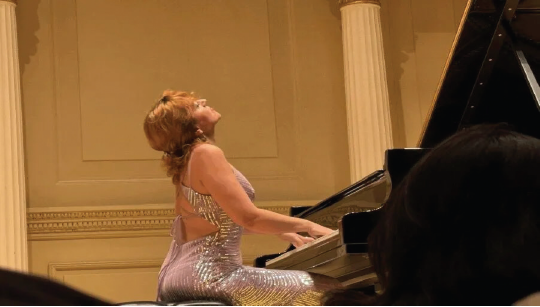On June 10, 2025, pianist Kariné Poghosyan took the stage at Carnegie Hall to honor one of Armenia’s most celebrated composers: Aram Khachaturian.
The performance, titled “Aram Khachaturian at Carnegie Hall,” was presented and sponsored by Ambassador Paruyr Hovhannisyan and the Permanent Mission of Armenia to the United Nations. Held in the Weill Recital Hall, the concert brought together a diverse and enthusiastic audience on a Tuesday evening.
The setting was elegant and intimate—gorgeous cream-colored walls, gold-painted accents and a Steinway grand piano centered in a brightly lit stage created a warm and inviting atmosphere. The room was filled with listeners of all backgrounds and ages, including many Armenians as well as non-Armenians, with some audience members appearing to be in their teens or 20s.
When the concert began, Poghosyan walked gracefully onto the stage in a stunning lavender gown with holographic sequins. She appeared to look like a mermaid. Notably, she wore high heels—a bold choice for a pianist, and a subtle indication of her skill, as she appeared unafraid that her feet may slip off the pedals.
What followed was an hour of the most exciting piano music. Poghosyan is known for her passionate playing, and this evening was no exception. Each time she took the stage, she sat down and dove into the music as if she had already been sitting there for hours. She held nothing back. Throughout the performance, it felt as though the spirit of every Armenian was held in each note.
There are many aspects of Poghosyan’s artistry that set her apart from other pianists. Though she was in concert attire, there was an intimate feeling to her performance—as if the audience had been transported into her living room. Poghosyan plays with every part of her body and soul, almost dancing across the piano. It is not unusual to see her leaning into her hips during playful sections of the music, as one might do with an Armenian dance.
While playing, her face tells her story. It is as if she is seeing a painting or a movie in her mind. The music evokes images, and even if you are not seeing exactly what she sees, you will feel something. With each note, she inspires living in a way that can make audience members want to conquer the world.
Poghosyan is also able to implement precise technical skills without compromising the emotion of her playing. Khachaturian’s style is relatively modern, but she never loses her footing—consistently making sense of his compositions. She appears to have enough confidence in her technique that allows her to fully connect with the emotional intention of each piece. This was especially noticeable in Toccata, a work so charged with energy, it could inspire anyone to run a marathon. Throughout the concert, her sweeping arpeggios and quick scales looked effortless. Sometimes, it sounded as if multiple people were playing piano at once, though it was only her.
In contrast, other pieces leaned into her divine feminine energy. During Two Selections from the Masquerade Suite—Nocturne and Romance, she gave the audience permission to feel, connect and appreciate every line and curve present in the music. During Oror, she held her audience like a lullaby should.
Pure Armenian joy radiated from her, even in musical moments that could be interpreted as sad. This, too, is a beautiful representation of the Armenian experience: finding joy in difficult times. It is what Khachaturian wrote, and what Poghosyan captured perfectly. She never sought approval or validation. The evening was purely about love for the music and gratitude for those present to share it.
Poghosyan ended the evening with two encores. The first was a widely recognized Khachaturian composition, clearly intended to create a collective joy and sense of community among the Armenian attendees. The second was a piece by Komitas, which gently settled the room’s energy, representing a return to simpler times. The audience could release a collective sigh and continue with their evening with a sense of calm satisfaction.
Audience member Joshua Bernard, who was not familiar with the music of Khachaturian prior to the concert, commented, “It is like she is having a conversation with the composer… It was some of the most beautiful playing I’ve ever heard.” Given Poghosyan’s intense study of Khachaturian’s music for her doctoral thesis, it is no surprise she presents his work with such intimate understanding and knowledge.
More information about Poghosyan, including her Patreon concert series and social media links, can be found at www.karineplays.com.

